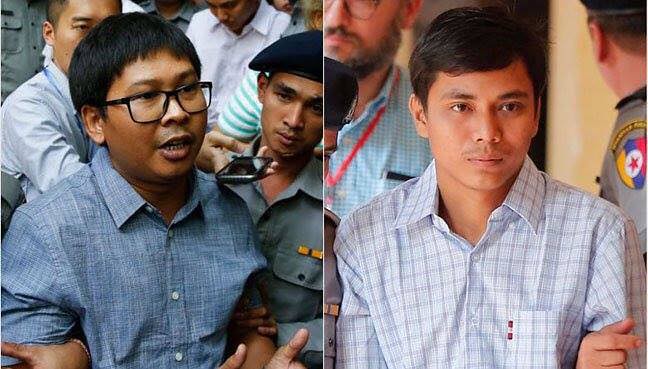The two Reuters journalists jailed for their reporting on a massacre of the Rohingya people have been released from prison after an amnesty order from President Win Myint.

Wa Lone (left) and Kyaw Soe Oo (right)
The BBC reported that Wa Lone and Kyaw Soe Oo were both freed after Myanmar’s President Win Myint issued an amnesty order issued on Tuesday (7 May). The two had spent more than 500 days in prison and were released along with more than 6000 other prisoners given an unconditional amnesty by President Win Myint to mark the Myanmar New Year.
According to Amnesty International, they were arrested in Yangon on 12 December 2017. At the time, the two were investigating the massacre of 10 Rohingya men and boys committed by members of the Myanmar security forces in northern Rakhine State, for which seven Myanmar soldiers were later jailed by a military court, where the fairness of proceedings came under question.
The two journalists were arrested on 12 December 2017 shortly after being handed official documents by police officers who had invited them to dinner in north Yangon that evening. In April, a police officer acting as a witness for the prosecution told the court that he and his colleagues had been ordered by a superior officer to “trap” the journalists.’. They were later awarded the 2019 Pulitzer Prize for international reporting in April 2019 for their reporting of the massacre.
Wa Lone and Kyaw Soe Oo were subsequently convicted under the Official Secrets Act and sentenced to seven years imprisonment in September 2018. In January 2019, the Yangon High Court rejected their appeal.

The amnesty order from President Win Myint (Source: The Global New Light of Myanmar, 8 May 2019)
Their release is now seen as offering a glimmer of hope for journalists working in Myanmar’s difficult environment. An editorial in The Irrawaddy said that the two journalists’ release “triggered a wave of rare optimism in Myanmar’s still depressingly repressive society” and that their freedom, and that of other activists also freed from prison, is “a small step on the long journey to press freedom.” Amnesty International’s East and Southeast Asia Director, Nicholas Bequelin, also said that this “marks an important victory for press freedom in Myanmar”.
Despite this, journalists in Myanmar continue to face threats and intimidation. Many members of the press, including an editor at The Irrawaddy itself, have been hit with lawsuits, and a number have been given long prison sentences. Amnesty International said that it “has recorded a surge in politically motivated arrests – most for criticism of the military” and called for the Myanmar government to “follow through its rightful decision to free Wa Lone and Kyaw Soe Oo by releasing all other journalists and prisoners of conscience detained on hollow charges, and by repealing all laws that keep a chokehold on freedom of expression.” Meanwhile, The Irrawaddy editorial asked that the government “ensure the safety of journalists, while helping to create enabling conditions for a free and responsible media, including regulatory and legal reform.”
Prachatai English is an independent, non-profit news outlet committed to covering underreported issues in Thailand, especially about democratization and human rights, despite pressure from the authorities. Your support will ensure that we stay a professional media source and be able to meet the challenges and deliver in-depth reporting.
• Simple steps to support Prachatai English
1. Bank transfer to account “โครงการหนังสือพิมพ์อินเทอร์เน็ต ประชาไท” or “Prachatai Online Newspaper” 091-0-21689-4, Krungthai Bank
2. Or, Transfer money via Paypal, to e-mail address: [email protected], please leave a comment on the transaction as “For Prachatai English”
